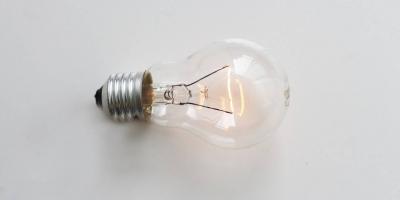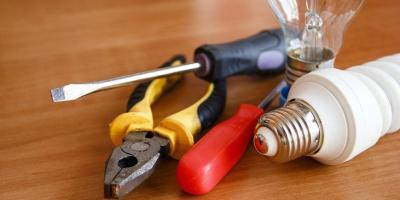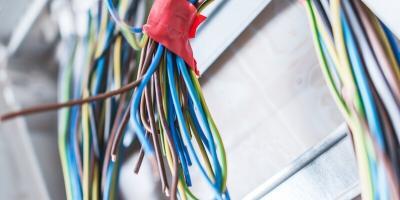As soon as you start your day, you use electricity for cooking breakfast, brewing a cup of coffee, and ironing your clothes to prepare yourself for work. You have been aware of some safety measures on your home's electricity, so you unplug all these appliances before leaving to be safe from electrical dangers.
You now find yourself sitting on your chair at work, doing the usual things. While typing on your computer, you heard a small explosion under your desk. You don’t know what to do in this situation, so it causes a fire damaging your office’s property. Hence, it is also vital to familiarise yourself with the common electrical hazards in your workplace and how to protect lives and hard-worked projects from them.
5 Common Electrical Hazards in the Workplace and How to Prevent Them
1. Overloading
One common electric hazard is overloading. It happens when the circuits in your office cannot carry anymore the demand power it experiences. It usually takes place after when you plug in multiple devices simultaneously. In your office’s case, using a lot of computers all at once can bring a probable risk of overloading.
Moreover, overuse of extension cords would result in overloading. Don’t use an extension cord to connect to another extension cord; this damages your electrical wires which may cause fire incidents.
Your office can avoid overloading by calling help from an electrician to update your connection. They can install more circuits to increase the overall electric load capacity of your workplace.
2. Faulty Wiring
People use electricity more often at offices. So, it creates more potential risk for faulty wiring. Loose, frayed, or cracked connections make wires less insulated, which can cause fires if not repaired immediately. These are the signs when your circuit needs repair:
- Flickering lights
- Burn marks on outlets
- Burning smell and buzzing sounds
- Circuit breakers usually trip or fuse blows
If you notice one of these signs, call an electrician for immediate check and repair.
3. Improper Grounding
A common type of plug used in offices is a three-pronged plug. The two prongs power up devices, and the other prong is for grounding electricity. Grounding is vital to return the excess current back to the ground whenever short-circuit happens.
Sometimes, a three-prong outlet is not available, so you remove the third pin from the plug, which you should never do. The third pin is a safety measure for protecting your device from excess current. Additionally, improper grounding installation brings electrical wiring risk in your office.
Hire an electrician to check if the outlets in your office are well-grounded. Moreover, if two-pronged sockets are the only ones available, then upgrade it to three-pronged ones for added safety.
4. Water near outlets or wiring
Water near outlets and electrical wiring is dangerous. It is a great conductor of electricity. So when it enters power outlets or exposed wiring, and you plug an appliance or directly touch the wires, you will most likely get in shock.
Move your power outlets away from water sources with the help of an electrician and avoid using electric devices in the bathroom. Also, don’t plug appliances when your hand is wet.
5. Loose Power Outlets
Devices connected to loose power outlets tend to overheat that may eventually cause a fire.
Make sure that electricians properly fix your outlets against the wall, and no exposed wires are visible.
Injuries and Accidents Related to Electrical Hazards in Your Workplace
Sometimes, you cannot avoid electrical accidents from happening. But, you can still save someone by knowing how to respond to these emergencies.
Electric shock
The human body is a great conductor of electricity, so you are at risk when you come in contact with a circuit. When you touch a loose wire, it could give you an electric shock that may affect your muscles and nerves.
So don’t ever touch wires with electric current through them. In case a colleague is in electrical shock, don’t also be a victim by directly pulling them. Turn off the main switch first to remove the flow of electricity, and immediately call emergency service for help.
Electric burns
Contact with electricity can also cause up to third-degree burns, depending on the voltage of exposure.
Apply first-aid procedures if you are qualified then, call emergency service for assistance.
Heart Attack
In extreme scenarios, contact with an electrical circuit can cause a heart attack since it involves high voltage.
In this situation, don’t panic and check if the person is still conscious and immediately call emergency service. If unconscious, perform CPR until responders arrive.
Fires
Electrical connections are fire-risk. Faulty wiring cause electricity to not properly flow; this overheats your circuits and connected devices that may lead to a fire incident.
Always have fire extinguishers available in your office. When they fail to contain the fire, call the fire department immediately.
Conclusion
Damages in your electric circuits and lack of knowledge about its safety measures cause electrical hazards. When your wires cannot conduct electricity well, your devices and connection are at risk for fire accidents. Furthermore, exposure to live wires can cause shock, burn, and heart attack. In this situation, turn off the main power and call for help immediately.
The best way to prevent these threats is to ask for guidance from an electrician about your wiring connection and repair them when necessary.
You spend most of your day in the office, so knowing safety precautions and causes of common electrical hazards is essential to avoid injuries and accidents in the future.
We at Gordon Powers prioritise your safety. We can detect electrical faults and repair them immediately to avoid hazards that will affect your office’s productivity. We have 24/7 electricians available, so don’t hesitate to call us at (02) 9199 7480 or book an appointment online now.










